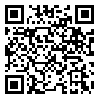Volume 17 - Supplement of 11th Annual Iranian Congress of Medical Ethics (Posters)
IJMEHM 2024, 17 - Supplement of 11th Annual Iranian Congress of Medical Ethics (Posters): 1-2 |
Back to browse issues page
Download citation:
BibTeX | RIS | EndNote | Medlars | ProCite | Reference Manager | RefWorks
Send citation to:



BibTeX | RIS | EndNote | Medlars | ProCite | Reference Manager | RefWorks
Send citation to:
Ghasempour M, Dadashzadeh A, Purabdollah M, Hoseini Lilab F. Moral Sensitivity Among Pre-Hospital Emergency Personnel: A Cross-Sectional Multicenter Study. IJMEHM 2024; 17 (S1) :1-2
URL: http://ijme.tums.ac.ir/article-1-6873-en.html
URL: http://ijme.tums.ac.ir/article-1-6873-en.html
1- Department of Medical Surgical Nursing, Assistant professor of Faculty of Nursing and Midwifery, Tabriz University of Medical Sciences, Tabriz, Iran
2- Department of Medical Surgical Nursing, Associate Professor of Nursing School, Qom University of Medical Sciences
3- Department of Nursing, Assistant Professor of Faculty of Nursing, Khoy University of Medical Sciences, Khoy, Iran
4- Master's student in Private Law, Department of Private Law, Faculty of Theology, Law and Political Science, Research Sciences Unit, Islamic Azad University of Tabriz, Iran
2- Department of Medical Surgical Nursing, Associate Professor of Nursing School, Qom University of Medical Sciences
3- Department of Nursing, Assistant Professor of Faculty of Nursing, Khoy University of Medical Sciences, Khoy, Iran
4- Master's student in Private Law, Department of Private Law, Faculty of Theology, Law and Political Science, Research Sciences Unit, Islamic Azad University of Tabriz, Iran
Abstract: (156 Views)
Moral sensitivity is a crucial attribute for pre-hospital emergency personnel, significantly impacting their ethical decision-making and patient care in urgent and often complex situations. Defined as the capacity to recognize ethical dilemmas and comprehend their implications, moral sensitivity empowers personnel to navigate challenges such as resource limitations, critical patient conditions, and the imperative for rapid, independent decision-making. This study aimed to evaluate the level of moral sensitivity among Emergency Medical Technicians (EMTs) and identify key influencing factors. A cross-sectional study was conducted in 2023, encompassing 245 EMTs selected through cluster random sampling. Data were collected using the Moral Sensitivity Questionnaire (MSQ) and analyzed employing correlation tests and regression analysis. The findings revealed a mean moral sensitivity score of (39.45 ± 7.13) among participants, indicating a moderate-to-high level of ethical awareness. A significant correlation was observed between moral sensitivity and specific demographic and professional characteristics. Notably, work experience emerged as a key determinant (P < 0.001). Regression analysis further emphasized work experience (β = 0.08, P < 0.001) as a strong predictor, demonstrating that increased exposure to clinical and ethical challenges over time enhances moral sensitivity. Enhancing ethical sensitivity among pre-hospital emergency personnel is paramount to improving their ability to identify and address complex ethical challenges and deliver high-quality patient care. Given the unique demands of emergency situations, including time constraints, resource limitations, and the need for immediate action, it is crucial to equip personnel with the tools necessary to recognize and navigate ethical dilemmas. Implementing comprehensive training programs that emphasize ethical awareness and reasoning can empower EMTs to make more informed and empathetic decisions. Furthermore, cultivating a supportive organizational culture that prioritizes ethical performance and provides ongoing training can further enhance their confidence and competence in managing ethically sensitive situations.
Keywords: Moral sensitivity, Emergency medical Technicians, Ethical decision-making, Cross-sectional studies
Type of Study: Ethics Congress |
Subject:
Congress of Ethics
Received: 2025/02/15 | Accepted: 2024/12/23 | Published: 2024/12/23
Received: 2025/02/15 | Accepted: 2024/12/23 | Published: 2024/12/23
| Rights and permissions | |
 |
This work is licensed under a Creative Commons Attribution-NonCommercial 4.0 International License. |





